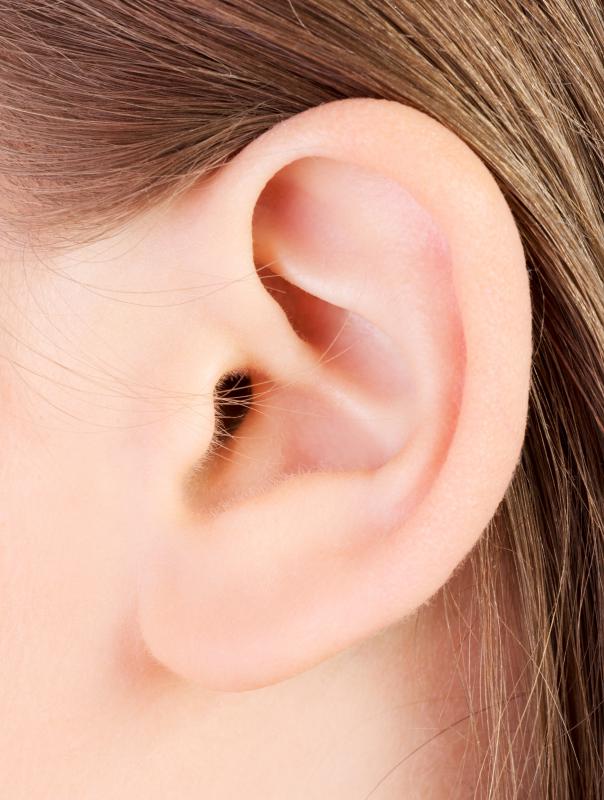At TheHealthBoard, we're committed to delivering accurate, trustworthy information. Our expert-authored content is rigorously fact-checked and sourced from credible authorities. Discover how we uphold the highest standards in providing you with reliable knowledge.
What are the Common Causes of an Earache and Toothache?
A variety of conditions can cause an earache and toothache, and the two symptoms are often related. Common causes include sinus problems, poor dental health, and various infections. People suffering from ear and tooth pain might have allergies and acute sinusitis, infections, swollen glands, or serious dental problems. Individuals with temporomandibular joint disorder (TMJ) also often experience discomfort in the jaw and ears.
Some people suffer from frequent earache and toothache as a result of sinus problems. Certain sinuses in the face connect to the nasal cavity and regulate temperature changes so that the eyes and roots of the teeth are not affected by rapid shifts in temperature. When an individual has a sinus infection, the passageways often become inflamed and clogged with mucus. As this happens, the sinuses expand and swell, causing pressure to build in the nasal cavity and surrounding areas, including the ears and dental roots along the jaw. As a result, a person with a sinus infection often experiences a tight, sore upper jaw, as well as an earache and a toothache.
A sinus infection can also spread, and a person has one — or even a common cold — might develop swollen glands. Like sinus pressure, swollen glands often cause pain around the neck, jaw, and ears.

Dental problems are a very common cause of toothache and earache pain. Common dental issues include tooth decay, fractured or cracked teeth, an exposed tooth root, damaged fillings, and infected gums. People who grind their teeth at night are also likely to experience pain.
Individuals who grind their teeth are also prone to TMJ, which can also produce pain in the ears and teeth. Pain associated with this condition is often more acute in the morning, as the individual may have ground his or her teeth throughout the night. Although this is a common cause of TMJ, there are many other reasons why people develop this condition.

In less common scenarios, people have experienced earache or toothache pain as a reaction to certain medications. Some amphetamines, in particular, cause people to tighten their jaw, resulting in sore jaw muscles and possibly toothache pain. Individuals suffering from earache and toothache pain should always inform a medical professional of any medications they may be taking.
AS FEATURED ON:
AS FEATURED ON:
















Discussion Comments
I have a friend working in the audiology department of a local hospital and she says that people often leave their ear infections far too long without treatment. Unfortunately, even if you think you can handle the pain, those symptoms and signs are there for a reason.
And your hearing isn't the only thing that's at stake. Remember that your inner ear is used for balance as well. It's also sensitive to pressure adjustments. I have another friend who had an ear infection that managed to get so bad they needed to fly her to another hospital and they had to sedate her, the pain was so unbearable when they flew up and her ears tried to pop.
@umbra21 - That does sound awful. I have a friend who tends to get really sore shoulders when she sits too long, I guess because she sits in the wrong position. If this happens when you're at your computer, maybe you could change your chair or your posture somehow?
I got really bad jaw and ear pain for a while and thought maybe I was going to have to have a root canal or something, but it turned out to be my wisdom teeth. Having a wisdom teeth removal was not pleasant, but at least now the pain is gone.
I suffer from TMJ and it's a pain in the neck, so to speak. I don't actually grind my teeth all that much, although according to my dentist I have teeth shaped in such a way that when I do clench them, they put pressure on a relatively small area of the jaw.
Add that to the fact that I tend to really tense up my shoulders when I'm stressed and you've got a bad combination. If I work too much at my computer, or if I get stressed out in general, I end up with pain all down my jaw and sometimes into my shoulder. For the longest time I thought it was a toothache, but there's nothing wrong with my teeth.
Luckily, now that I know what's happening, I can control it more by making myself relax, but sometimes even knowing what's happening isn't enough. The only comfort is that it's not some kind of terrible disease that's going to destroy my jaw. It's painful, but livable.
Post your comments